Aww yiss! It's our first official Masculinity Monday! And to start this series off, I thought it only appropriate to talk about Netflix's Daredevil. While there are lots of amazing things to examine about this show - like how the show profits from the oversaturation of superheroes in the media right now to the large ethical dilemmas presented in the plot to the amazing awesomeness of Claire Temple and Karen Page - I think the show really functions best as an analysis of masculinity.
And I don't even mean that in a snarky passive-aggressive commentary on how few female characters there are in the series. As I pointed out above, the women of this show are pretty freaking rad. From Doris Urich, a decorated soldier who helped blow the whistle on the mistreatment of veterans, to Marci Stahl, a shark in a really nice suit whose every line is hilarious but who also has this level of depth and pathos you just adore, the women of this show are amazing. Daredevil isn't an exploration of masculinity because of some lack in feminine representation. It's about masculinity because it uses its three main characters to look at three very different ways to be a (white) man in current American society.
Which is something I find interesting, so we're going to talk about it.
Obviously there are more than three male characters on Daredevil, but the characters we follow most and in whom we become most invested are definitely Matt Murdock (Charlie Cox), Wilson Fisk (Vincent D'Onofrio), and good old Foggy Nelson (Elden Henson). The three of them cover a range of presentations of masculinity and ideas of what it means to be a man, and that range goes from the supremely unhealthy to the perhaps romantic but equally damaging to the genuinely healthy and appropriate.
But even beyond these three dudes, masculinity is a constant theme in Daredevil. All that talk of fathers and sons, all of Matt's conversations with Father Lantom about how a man ought to behave in certain situations, all of the background characters bleeding through with their ideas and ideals of what it means to be a man. It's always on our minds, what masculinity is and who exactly gets to define it.
One of the great virtues of the show, I would argue, is actually this wealth of meditation on the subject of masculinity. Because there is so incredibly much of it, it feels like we get a better handle on the subject than we might otherwise. So. Let's get going!
Definitely the first thing that comes to mind when we start talking about Daredevil and masculinity is obviously Matthew Michael Murdock and his ridiculous abs. Or maybe that's just me. But I think that for a lot of people it feels like Daredevil offers a very simple dichotomy. On the one hand you have Wilson Fisk and his toxic masculinity and on the other you have Matt Murdock and his healthy, heroic masculinity. Right?
Actually, no. I think what the show is doing is more complex than that. Mainly because I don't really see Matt Murdock as being a particularly good example of healthy masculinity. At least, not when the series starts.
Think about it. When we enter the story of the show, Matt is in a tricky situation. He has all of these superpowers and desire to save the world, but he's only just started doing it. He's a little unhinged, isn't he? He fights brutal and bloody and yeah he saves people, but he does it by incurring their problems into himself.
His is an ascetic and selfless masculinity, but not what I would consider a good one. And no wonder! When we look at Matt's two main father figures, Jack Murdock and Stick, we can see how he got this idea.
Basically, Matt's concept of what it means to be a man is entirely rooted in violence. And that's not okay for him or for anyone else. Inspired by his father who he revered despite his flaws, Matt's got it in his head that the only real way to help people is to fight for them. That fighting is the answer. Claire points it out to him a couple of times too. It's not that Matt is a sadist, but rather that he doesn't know any other option. Whether it's in a courtroom or in a back alley, Matt's understanding of how men deal with life is to fight.
That's a very appealing and persuasive way to look at life. When you view it all as a battle to be won no matter the cost, life feels much simpler and easier to handle. Matt can solidify all of his problems into two categories: things he can fight and things he has to live with. His life is basically barren except for that. And he's always on the lookout for another battle to enter. He's constantly going around inserting himself in situations that could turn violent or prosecutorial because he knows of no other way to be a "good man". A good man fights for those who cannot fight for themselves. And sure, that's true, but it's not the whole truth. I don't think Matt knows that.
What's most interesting here is how our culture reacts to this. By American cultural standards, this view of the world is what we would consider healthy masculinity. I mean, he's clearly a good person. He goes to church and he talks to a priest all the time and he really thinks about the ethical questions around him. Matt is strong, both physically and emotionally, and he really does fight for what he believes in. So is he not what we should consider a good example of masculinity?
Not in my book.
The problem is that Matt's version of masculinity eats him up inside. It's caustic, wearing away at his humanity. It forces him to lie to his friends "for their own good" and causes him to condescend to them. Not consciously, of course, but he thinks of them as weaker than him. They "don't need to know" because the truth "could hurt them".
In a weird twisted way, Matt isn't strong enough to handle the idea that his friends don't need his protection. He needs to believe he's needed. And that doesn't seem healthy at all. A masculinity that cannot handle the world as it is probably isn't one worth emulating. Arguably Matt's greatest weakness is his desire to show no weakness. He doesn't even allow his best friend close enough to help him.
Then again, Wilson Fisk's violent and toxic masculinity isn't really a safe bet either. Fisk is the villain of our piece, and while he is absolutely definitely a complex and compelling character in his own right, he also fits very neatly into our ideas of what "bad" masculinity looks like. He's a big man and he is physically violent. It sometimes seems like these bursts of rage consume him and take away his control, like when he flips a table in his own apartment or when he smushes Anatoly's head in that car door. Fisk's temper is unpredictable and terrifying.
In his case as well we can easily trace this to his father. What makes Fisk and Matt different, though, is that Fisk doesn't revere his father. He hated his father. He is trying with all his might to be a man his father never could be, a controlled and calm and powerful man who doesn't actually have to use violence to get people to do what he wants. It's just that he's not always successful.
No matter how hard Fisk tries to get away from his father's legacy, it seems to keep running after him. But in a strange way, I would actually argue that Fisk's masculinity is closer to being healthy than Matt's is for one simple reason: it's self-aware. Fisk knows that he has problems. He knows that his violent tendencies and desire to rely on his strength and power are not actually good or beneficial traits.
For the majority of the series he's wrestling with this and it makes for very compelling drama. I mean, there's a reason why the scenes we most relate to Fisk in are the ones where he is emotionally vulnerable and connecting with another human being. When you really think about it, Fisk has more scenes like that than Matt does. Matt's vulnerability comes much later in the show.
In other words, Fisk is a more healthy (though not actually healthy) image of masculinity because he is aware of all of the ways in which he falls short of being "a good man". Matt sees no real problem with his way of life for the majority of the series, and so his masculinity is the worse for being non-self-reflective. Does that make sense?
Doesn't matter. We're moving on.
All of that was just prelude because now I want to talk about the real masculine hero of Daredevil. That's right, out of everyone on the show, from Wesley to Nobu to Ben Urich to Stick, the character who I think best embodies a genuinely healthy and good masculinity is Foggy freaking Nelson. And i have good reasons for this.
First off, Foggy is very self-aware. I listed that above as being one of Fisk's better traits and one of Matt's definite deficiencies. Foggy knows exactly who he is, even when most people would let their pride or vanity gloss over the truth. He considers himself not bad looking but pretty decidedly average (though the actor is definitely the male version of "Hollywood Homely"). He knows he's not a great fighter but he's willing to pick up a baseball bat and try to help someone. He's a moral man but he's also capable of being swayed by the promise of a steady paycheck and free bagels.
Foggy knows exactly who he is. He's a man trying his best to be good and sometimes he makes it and other times he doesn't. He knows this and that makes him a much healthier character than pretty much everyone else on the show. Definitely more healthy than Matt and Fisk
But the real reason I think Foggy is the character who best embodies a good and healthy masculine ideal is because of his heart. Because he's kind. Foggy Nelson is the kind of guy who shows up at his elderly client's apartment to repair her wall. He wasn't able to get her landlord to fix it and he's made no real legal process. He also doesn't know crap about construction. But he shows up anyway and he tries to help because Foggy Nelson is a good man. He knows he isn't the most qualified or best or strongest and he helps anyway. He's not proud, he's just good.
And here's another reason: he cries. Foggy's heart is open and breakable and quite frankly I think that makes him the best male character on the show. When he discovers that his best friend has been lying to him for years and actually has superpowers, Foggy's immediate reaction is to make sure said friend doesn't die, but as soon as he knows Matt will be all right, Foggy is open and honest about his emotions. He cries. Weeps, even. Foggy makes it clear that his heart hurts and he does not apologize for that. While Matt looks like he resents every tear he sheds because he's supposed to be some kind of stone-cut vigilante, Foggy just cries. Openly and without shame.
He knows his limits. He's kind. And his heart is soft enough to be bruised. Foggy Nelson is the ideal man to come out of Daredevil because he's the only one who knows his own heart and he's the only one to have what I would call "a heart of flesh".
I feel like it's not a hard concept, but I'll elaborate. Matt and Fisk do everything they can throughout the run of the show to make their hearts into stone. Matt does this because he believes the toxic ideal that connections and relationships are a weakness. Fisk does it because he thinks that ruthlessness is the only way to have power. But Foggy takes a very different path. His heart is all flesh all the way through. There is no stone there. When his feelings are hurt they show. When he's happy he practically glows. His heart is flesh and that's his superpower.
And, ultimately, it works out for him, doesn't it? I mean, Foggy's heart of flesh is what makes him able to repair his relationship with Matt. Because he cries and is honest about his feelings he forces Matt to confront his issues as well. With Matt actually doing some real self-examination he's able to step back from the ledge of mutually assured destruction and do something constructive to get rid of Fisk.
Foggy's fleshy heart and belief that anyone can be a good person is what gets Marci to hand over the files that get Fisk arrested. It's not Matt's punching ability or Fisk's evilness that change her, it's the idea that Foggy Nelson thinks she can be a good person. His heart.
He gets the cops on their side by being nice to them and remembering birthdays and getting presents for mothers. He takes a night out of his life to make sure that Karen feels safe in Hell's Kitchen again and in so doing wins her loyalty and friendship. Foggy's a great guy and he's one of the key parts in saving their city. Foggy and his big heart.
Isn't this the masculinity we actually want to value? I mean I'm all for the entertainment value of watching Daredevil punch people, but at the end of the day, I don't want more Matt Murdocks in the world. I want more Foggy Nelsons. If I could show this series to any impressionable boys, I wouldn't want them to come away with the idea that heroism is throwing yourself off a three story building and doing parkour in a red suit. I'd want them to see how influential and life-changing it is to be kind and openhearted and listen. I'd want them to understand that so much of morality and courage is about little choices every day.
Matt and Fisk are operatic figures, larger than life. But Foggy isn't. He's human and little and finite like us. The world needs more men like Foggy Nelson. Men who know they are weak and don't let that get in the way of their attempts to do something good. Men who care and are not ashamed of that. Men who try to make the world a better place not in grandiose gestures but by getting someone a cup of coffee or asking how their day was.
A "good man" isn't a man always out looking for a fight. He's a man with heart of flesh looking for the right thing to do in his every day life. I'm not saying that we don't need grand heroic figures. I'm just saying that what we need more and what the media seems less ready to provide is a supply of men who cry and men who heal.
More of this, please. Thanks.


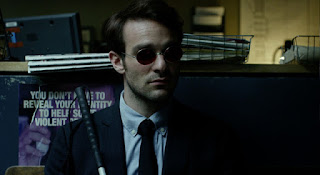
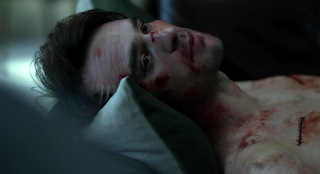
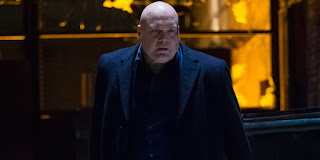
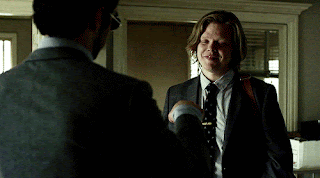
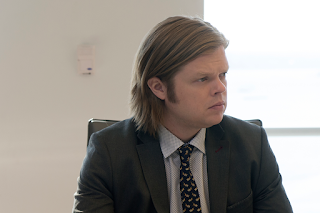
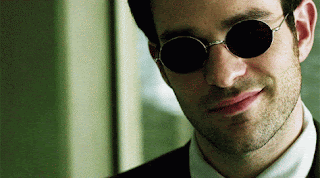
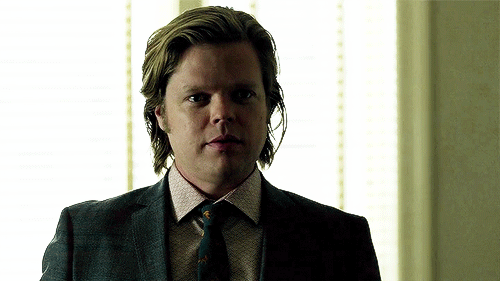
I love this. So many great points. Do you think most viewers would pick up on this, at least subconsciously? I'm also curious to see how they continue to develop these characters in season two. It will be interesting to see if Daredevil the show makes Matt into the "man without fear", and if so, what that will mean for his masculinity.
ReplyDeleteI really am very curious about where this goes. It's interesting to me because out of all the male superheroes out there, there aren't a lot who I would consider to be healthy representations of masculinity. Daredevil is just one more in our arsenal of tempting but ultimately toxic visions of what it means to be a man. So, yeah, I have no idea how this is going to play out, but I'm very excited to see.
DeleteIn other words, Fisk is a more healthy (though not actually healthy) image of masculinity because he is aware of all of the ways in which he falls short of being "a good man".
ReplyDeleteOne of the ideals that masculinity is traditionally associated with is loyalty, specfically mutual loyalty between men. And the strongest loyalty of that kind is the one between Fisk and Wesley. I'd found it interesting that the two were so solid, but until reading this never thought of it in masculinity terms. But it's just *clear* that there's no force on this Earth that would make Wesley betray Fisk, and that fear of the consequences isn't why. Likewise, nothing would make Fisk doubt Wesley, or use fear to keep him in line.
Excellent point. I wanted to get to Wesley in this article but it was just getting too damn long. He's such a fascinating character to me because in a lot of ways he's a very healthy one. Sure he's kind of a sociopath, but he has friends. He loves the people around him. He believes in his work and what he's doing. He's confident in himself but also doesn't seem to be especially insecure about his place on Fisk's team or his own abilities... He's a really complex and interesting character and I adore their relationship. So, yes. All of this.
DeleteBringing it back to Foggy, he had that same loyalty to Matt, but Matt ... didn't share it? I don't know, I suppose it depends to what degree he owed the truth to Foggy. There came a point where Foggy was involved enough that he did, but I'd hesitate to say that point arrived before Foggy found out anyway.
ReplyDeleteHm. I certainly agree with some of your points, some I don't. I completely agree that Foggy is a great guy and the healthiest example of real masculinity. Foggy is the guy we (should) all want to marry. Matt's the intense guy many women would fall for but absolutely shouldn't, because there is no way any woman could have a healthy relationship with him.
ReplyDeleteI definitely don't agree that Fisk's masculinity could be argued as healthier than Matt's, or that he's self aware. I think deep down he knows his outbursts are wrong, but he doesn't actually come to accept that until the very last episode of season 1, when he recollects the story of the good Samaritan. He even says he always thought he was the Samaritan. When he speaks to Vanessa, though his love for her can be touching, his words about how he's trying to save the city seem... like he's just lying to himself.
And I somewhat disagree with the analysis of Matt Murdock. Though I do agree that impressionable boys would most likely reach out for the Daredevil character to emulate, the TV show is rated MA and is not really suitable for them to watch anyways. There are a lot of complicated ideas and emotions no young person would understand, not to mention the intense gore in some scenes.
Lastly, I don't get the impression that the idea is to worship Matt Murdock as the healthy masculine individual. The tone of the show is dark because Matt is a very troubled man. I would hope most people wouldn't watch him almost die several times and then think that it's working for him. He's torn between what he's been taught, his high standards of who he should be, and his desire to help others. The story is his evolution as a man. It's true that he doesn't reach out to his friends at all at first, and he doesn't open up to Foggy until he has to, but then there's that scene in episode 12 where he reaches out to Karen, and he tells her "I can't do this alone. I can't take one more step", and he weeps with her willingly.
KOLKATA ESCORTS
ReplyDeleteKOLKATA ESCORT
KOLKATA ESCORT SERVICE
KOLKATA INDEPENDENT ESCORTS
KOLKATA INDEPENDENT ESCORT
ESCORT IN KOLKATA
ESCORTS IN KOLKATA
VILLAGE CALL GIRLS
VILLAGE CALL GIRL
CALL GIRL
CALL GIRLS
ESCORT
ESCORTS
KOLKATA FEMALE ESCORTS
KOLKATA HOTEL ESCORTS
KOLKATA MODEL ESCORTS
KOLKATA CALL GIRL
KOLKATA CALL GIRL SERVICE
KOLKATA CALL GIRL SERVICE
KOLKATA CALL GIRLS
CALL GIRL
CALL GIRLS
CALL GIRLS SERVICE
CALL GIRL SERVICE
KOLKATA INDEPENDENT CALL GIRLS
KOLKATA INDEPENDENT CALL GIRL
ESCORT
ESCORTS
ESCORTS SERVICE